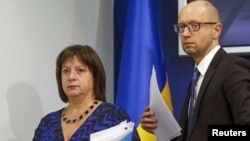Ukraine has imposed a moratorium on the repayment of a $3 billion Eurobond held entirely by Russia, Prime Minister Arseny Yatsenyuk said on Friday, after Moscow refused to accept the terms of a restructuring of the debt.
The Eurobond matures on Dec. 20, but Ukraine has a 10-day grace period before it will be considered to be in default.
Yatsenyuk said Kiev was willing to fight the issue in court, while the Finance Ministry said it was still committed to negotiating a restructuring agreement in good faith with Russia.
Ukraine has included the two-year bond in the external commercial debt it is restructuring to shore up its war-torn economy. But Russia has refused to accept the terms it has offered, arguing that the bond was an official bilateral loan.
"Since Russia has refused, despite our repeated efforts to sign a restructuring agreement..., to accept our proposals, the cabinet is imposing a moratorium on repayment of the so-called Russian bond," Yatsenyuk said in a government meeting.
Yatsenyuk also said Ukraine would cancel payments on $507 million of Ukrainian commercial debt held by Russian banks.
The moratorium will be in place "until the acceptance of our restructuring proposals or the adoption of the relevant court decision ... We are prepared for court action from the Russian side," he said.
The Finance Ministry sounded a more conciliatory note, saying in a statement: "Ukraine remains committed ... to negotiating in good faith a consensual restructuring of the December 2015 Eurobonds."
To qualify for more lending from the International Monetary Fund, Ukraine must show it is open to negotiating in good faith with Russia on a restructuring deal.
Russia has also expressed a willingness to address the issue in court.
Its position was bolstered on Thursday after the IMF said it also classified the bond as official debt. But the Fund has also changed its policy to allow it to keep lending to countries in arrears on repayments of such debt, effectively throwing Ukraine a borrowing lifeline.
Kiev must also show that is "pursuing appropriate policies" to continue receiving support under its $17.5 billion IMF bailout program. On Friday the IMF warned that the program was under threat from apparent rejection by parliament of critical tax amendments and the draft 2016 budget.





